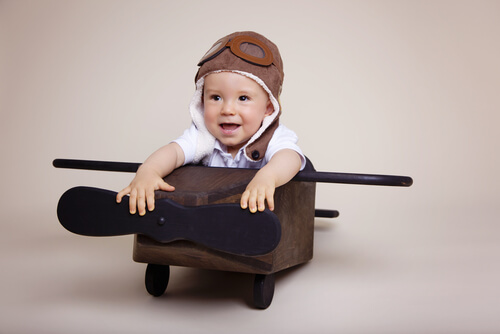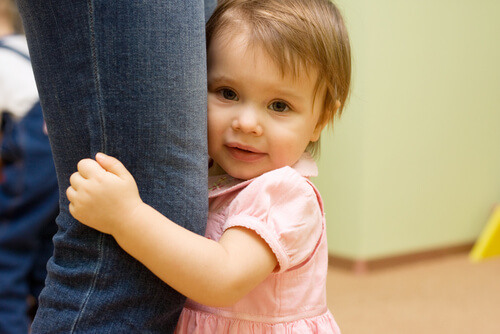Lack of Stimulation Can Cause Delayed Development in Babies


Reviewed and approved by the psychologist María Alejandra Castro Arbeláez
Not all children are mentally stimulated correctly or as often as necessary. Lack of stimulation can cause delays in babies’ development. Here’s how to identify the lack of stimuli and how we can solve this problem over time.
Babies need care, love, and attention mainly from their parents and siblings (if they have them). Otherwise, babies who don’t have fundamental interactions that motivate and excite them tend to have different levels and types of delays in their development.
Lack of stimulation can cause slight psychological, emotional and social consequences. This can be evidenced in various types of stagnation during their growth, such as backwardness with intellectual abilities, difficulty in integrating into society, poor management of emotions or deficient self-control.
Aggressive reactions from a young child are demonstrations of certain shortcomings that could happen in their first few months of life. They are usually consequences of frustration caused by lack of attention, motivation and early stimulation.
What is early stimulation and what is it for?

“Stimulation or early attention provides children with the best opportunities for physical, intellectual and social development so that their abilities and skills allow them to be better than they would have been without this environment rich in intellectual and physical quality stimuli.”
Stimulation is a tool that all mothers must learn to develop during the growth of their child. It serves to solidify personality, self-esteem and social integration.
It is imperative that children are very well stimulated from the womb until 7 years of age because in that period of time their brain is very malleable.
Love is the main positive stimulus of a baby. A lack of love can negatively affect a child’s integration with society and favor the attention deficit.
How to identify a lack of stimulation in babies?

Mothers instinctively know their babies. However, sometimes we do not realize certain aspects that may not be perfectly normal. Some ways to recognize if our child needs additional stimuli are those mentioned below:
- Slow progress of gross motor skills
- Poor handling of fine motor skills for their age
- Difficulties coping with basic activities such as crawling
- Extreme shyness
- Language problems or slowness to start talking
- Low self-esteem (frequent use of words such as I can’t, I don’t know, etc.)
- Few interpersonal relationships
What to do in the absence of stimuli
Once we have detected behaviors in our little one that tell us there is a lack of stimulation, depending on the level of complexity, we can take certain actions to amend the issue at home and/or combine it with tools that a professional provides after studying our child.
- At each stage of our baby’s growth, it is possible to introduce stimuli or activities that are developmentally appropriate according to their age such as dancing, singing children’s songs and playing hide-and-seek.
- Hugs, kisses, touching, massaging, smiling and talking are means of stimulation that represent love, patience, and serenity. These tools will help you strengthen the bond you have with your baby.
- Your baby’s mood can change just by feeling they don’t have enough attention. Under no circumstances will they learn by being ignored. We can provide help specifying, repeating and demonstrating.
- The easiest way to change our child‘s mood is by hugging them and spending time with them. The more time they want to stay curled up in your arms, the more positive and satisfying the results.
- Professional help is an excellent option for more complex cases that can help our children in psychomotor, cognitive and emotional areas.
- Group therapy allows socialization with other children with the same difficulties and integrates music, shapes, colors and specific exercises for learning that can be applied later at home.
Since a baby is born, they have the need to learn and discover the world around them. Support during this stage with good stimulation (full of love) will have a positive impact on many aspects of their life and the circle of people around them.
Not all children are mentally stimulated correctly or as often as necessary. Lack of stimulation can cause delays in babies’ development. Here’s how to identify the lack of stimuli and how we can solve this problem over time.
Babies need care, love, and attention mainly from their parents and siblings (if they have them). Otherwise, babies who don’t have fundamental interactions that motivate and excite them tend to have different levels and types of delays in their development.
Lack of stimulation can cause slight psychological, emotional and social consequences. This can be evidenced in various types of stagnation during their growth, such as backwardness with intellectual abilities, difficulty in integrating into society, poor management of emotions or deficient self-control.
Aggressive reactions from a young child are demonstrations of certain shortcomings that could happen in their first few months of life. They are usually consequences of frustration caused by lack of attention, motivation and early stimulation.
What is early stimulation and what is it for?

“Stimulation or early attention provides children with the best opportunities for physical, intellectual and social development so that their abilities and skills allow them to be better than they would have been without this environment rich in intellectual and physical quality stimuli.”
Stimulation is a tool that all mothers must learn to develop during the growth of their child. It serves to solidify personality, self-esteem and social integration.
It is imperative that children are very well stimulated from the womb until 7 years of age because in that period of time their brain is very malleable.
Love is the main positive stimulus of a baby. A lack of love can negatively affect a child’s integration with society and favor the attention deficit.
How to identify a lack of stimulation in babies?

Mothers instinctively know their babies. However, sometimes we do not realize certain aspects that may not be perfectly normal. Some ways to recognize if our child needs additional stimuli are those mentioned below:
- Slow progress of gross motor skills
- Poor handling of fine motor skills for their age
- Difficulties coping with basic activities such as crawling
- Extreme shyness
- Language problems or slowness to start talking
- Low self-esteem (frequent use of words such as I can’t, I don’t know, etc.)
- Few interpersonal relationships
What to do in the absence of stimuli
Once we have detected behaviors in our little one that tell us there is a lack of stimulation, depending on the level of complexity, we can take certain actions to amend the issue at home and/or combine it with tools that a professional provides after studying our child.
- At each stage of our baby’s growth, it is possible to introduce stimuli or activities that are developmentally appropriate according to their age such as dancing, singing children’s songs and playing hide-and-seek.
- Hugs, kisses, touching, massaging, smiling and talking are means of stimulation that represent love, patience, and serenity. These tools will help you strengthen the bond you have with your baby.
- Your baby’s mood can change just by feeling they don’t have enough attention. Under no circumstances will they learn by being ignored. We can provide help specifying, repeating and demonstrating.
- The easiest way to change our child‘s mood is by hugging them and spending time with them. The more time they want to stay curled up in your arms, the more positive and satisfying the results.
- Professional help is an excellent option for more complex cases that can help our children in psychomotor, cognitive and emotional areas.
- Group therapy allows socialization with other children with the same difficulties and integrates music, shapes, colors and specific exercises for learning that can be applied later at home.
Since a baby is born, they have the need to learn and discover the world around them. Support during this stage with good stimulation (full of love) will have a positive impact on many aspects of their life and the circle of people around them.
All cited sources were thoroughly reviewed by our team to ensure their quality, reliability, currency, and validity. The bibliography of this article was considered reliable and of academic or scientific accuracy.
- Choca, F. (2007). VÍNCULO EN EL BEBÉ PREMATURO. Revista de APPIA-Octubre, (16), 56. https://www.bvspsi.org.uy/local/TextosCompletos/appia/079737212007001605.pdf
- Espina, A., & Ortego, A. (2005). Guía práctica para los trastornos de déficit atencional con/sin hiperactividad. Ed. Janssen Cilag.
- Fajardo, E., Pazmiño, M. I. A., & Dávalos, Á. (2018). La estimulación temprana como factor fundamental en el desarrollo infantil. Espirales revista multidisciplinaria de investigación, 2(14), 25-36. https://scholar.archive.org/work/mc2wbvnq2rbp5ovgaej7revhca/access/wayback/http://www.revistaespirales.com:80/index.php/es/article/download/229/178
- Huerta, R. (2011). El juego simbólico. PULSO. Revista de Educación, (34), 227-230. https://revistas.cardenalcisneros.es/index.php/PULSO/article/view/122/98
- Jeta, P. M. P. A. (1998). El desarrollo emocional infantil (0-6 años): Pautas de educación. In Ponencia presentada en el congreso de Madrid. España. http://www.waece.org/biblioteca/pdfs/d069.pdf
- Muñoz Silva, A. (2005). La familia como contexto de desarrollo infantil: dimensiones de análisis relevantes para la intervención educativa y social.
- Vernengo, M. P., Zucchi, A., Silver, R., Felberg, L., Mindez, S., Mrahad, M. C., … & Raznoszczyk de Schejtman, C. (2008). Dimensiones del juego madre-bebé en el primer año de vida: Escala de Interacción Lúdica. In XV Jornadas de Investigación y Cuarto Encuentro de Investigadores en Psicología del Mercosur. Facultad de Psicología-Universidad de Buenos Aires. https://www.aacademica.org/000-032/242
- Villanueva Suárez, C., & Sanz Rodríguez, L. J. (2009). Ansiedad de separación: delimitación conceptual, manifestaciones clínicas y estrategias de intervención. Pediatría Atención Primaria, 11(43), 457-469. http://scielo.isciii.es/scielo.php?script=sci_arttext&pid=s1139-76322009000400008
- Silberg, J., & Castillo, L. S. (1998). Juegos para desarrollar la inteligencia del bebé. Oniro.
This text is provided for informational purposes only and does not replace consultation with a professional. If in doubt, consult your specialist.








